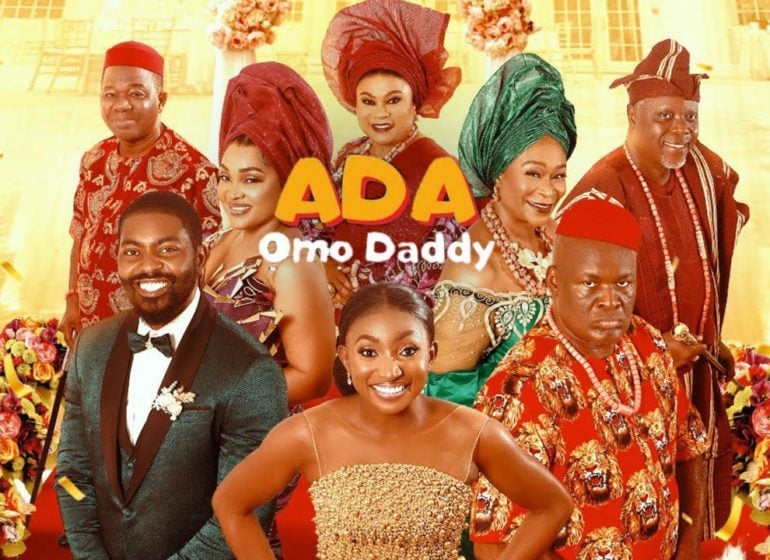Mercy Aigbe’s debut cinema movie, ‘Ada Omo Daddy’, finally premiered on Netflix after more than a year of its release.
Its lineup of talented veteran actors had built anticipation, leaving movie lovers eager to see it since 2023.
The film didn’t live up to the hype.
Its story had the potential to make a solid viewing experience, but the way it was executed missed the mark. The film’s narrative direction strayed from what appeared to be its original theme, sending the wrong message.
SYNOPSIS
‘Ada Omo Daddy’ tells the story of Ada, a young woman preparing for her wedding. Her biological father, who was absent for most of her life, appears, causing turmoil in her family. Ada struggles to make sense of her identity and past. She is forced to choose between her adoptive and biological father, leading to a complex exploration of family dynamics in a way that demonstrates the costs of parenthood.
STRONG POINTS OF THE FILM
The film did a great job showcasing the wealth of the Balogun family through its set design. From their lavish costumes and luxurious home to the elegant breakfast setup, every detail reinforced their affluence. It wasn’t just mentioned in the dialogue—it was visually evident, making the set design one of the movie’s strong points.
The film also did a great job with language, authentically representing both cultures explored in the story.
The Yoruba-speaking characters were fluent, as did the Igbo-speaking ones, with their traditions beautifully showcased, particularly in the wedding scene and Pero’s “homecoming” party. Another standout moment was the use of the Efik costume in the introduction, which subtly but beautifully reinforced the theme of intertribal marriage. It’s one of the film’s most commendable aspects.
The cinematography was also impressive, with well-framed shots and vibrant visuals that enhanced the film’s aesthetic. The lighting and camerawork made the scenes more engaging and visually appealing.
The cast performances were decent, with standout performances from Omowunmi Dada, Sola Sobowale, and Mercy Aigbe, who embodied their roles professionally.
However, a stronger direction could have elevated the overall acting.
Tayo Faniran, for instance, put in the effort but didn’t fully convince in his role, while Chiwetalu Agu’s presence made little impact on the film.
With better direction, the entire cast could have delivered even more compelling performances.
WEAK POINTS OF THE FILM
The biggest flaw of the film is its storytelling, which felt inconsistent and unconvincing. It almost seemed like I was being manipulated into believing that Ifeanyi deserved a second chance.
While the theme of forgiveness is understandable, the contrast between the flashbacks and Ifeanyi’s present-day words and expressions made it hard to buy into.
For instance, in the flashback where he supposedly searched for Pero as a toddler, he still came across as a father who didn’t genuinely care, yet in the present, he claimed he always had. The inconsistency was glaring. Throughout the movie, he never truly appeared remorseful for his past actions, making it seem like the story was excusing deadbeat fathers and suggesting they can return whenever they please without consequences. He was meant to embody the theme of forgiveness, but his audacity, despite never having been there for his daughter, made his redemption feel unearned.
Another major issue with the storytelling is the lack of logic and realism in certain scenes. For instance, when Victor received a call about his missing fiancée while in the bathtub, he simply continued his bath as if nothing had happened. It was an odd and unrealistic reaction to such distressing news.
Similarly, Pero’s sudden attachment to her newly discovered father felt unconvincing. Instead of directing her anger at the man who abandoned her during a crucial period, she was made to resent her mother for keeping the truth from her. It was puzzling, especially considering she had a father figure who had been there for her all along. Her quick shift in loyalty made her seem ungrateful and indifferent to her mother’s pain. While this might have been an intentional choice by the writer and producer, these inconsistencies didn’t just affect individual character arcs. They weakened the film’s overall message, making it unclear what values it was trying to uphold.
Another flaw in the movie is its sound design. The soundtracks were often too loud, overpowering the emotional depth of key scenes rather than enhancing them. For instance, in the scene where Ireti narrated the backstory, the emotions should have been felt through her words and expressions alone. However, the overpowering soundtrack took away from the moment, making it harder to connect with her pain. Instead of complementing the storytelling, the background music and sound effects were often too noisy and distracting.
The film’s continuity also needed more attention. The flashback scene was meant to take place over 20 years ago, right? However, Phyna’s outfit didn’t reflect that era, it was too modern. Small but important details like this can affect the film’s authenticity and overall storytelling.
FINAL VERDICT
‘ADA OMO DADDY’ GETS A 6/10
Copyright 2025 TheCable. All rights reserved. This material, and other digital content on this website, may not be reproduced, published, broadcast, rewritten or redistributed in whole or in part without prior express written permission from TheCable.
Follow us on twitter @Thecablestyle

